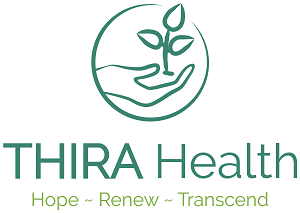
Editor’s note: This article was sponsored by THIRA Health.
Maintaining a healthy relationship with food and body is so important, yet it can be so tough to do. We live in a “diet culture” society that values thinness and equates it with health and moral value, which means we’re constantly surrounded by messaging that can make us feel bad about our bodies and food choices. The approaches of Health at Every Size and All Foods Fit serve as alternatives to diet culture and help us discover new ways to think of food and our bodies that foster lifelong health and well-being.
Health at Every Size
Health at Every Size, or HAES, is a health-care approach that focuses on holistic health and weight inclusivity. This means that health is seen as an amalgam of many different factors (such as access to care and socioeconomic status), and it looks different for each individual. Additionally, a person’s weight is not the sole — or even the most reliable — indicator of their health status.
The HAES framework is constructed of five principles that are designed to promote equal access to quality health care: weight inclusivity, health enhancement, eating for well-being, respectful care and life-enhancing movement.
When it comes to treating eating disorders, the HAES model empowers practitioners to provide inclusive, quality care to all patients. It is impossible to tell the severity of someone’s illness by looking at the size or shape of their body, and by decentering weight as the primary indicator of health, patients can be treated as whole, diverse and multifaceted beings.
All Foods Fit
All Foods Fit is an approach to nutrition care that rejects the idea of “good” and “bad” foods. When we think of foods as good or bad, it can translate into feeling morally superior for eating certain foods, and morally inferior for eating others. This can lead to a disordered relationship with food in which people feel guilt or shame for eating foods they see as “bad.” The All Foods Fit model in the treatment of eating disorders focuses on healing the person’s relationship with food first. When people have a healthy relationship with food, they are more inclined to choose a variety of different foods that not only foster physical health but also mental health.
How to use these models at home
Many parents wonder how they can help foster a positive relationship with food and body image at home, either to prevent disordered eating or as a way to help with eating disorder treatment. Here are some common phrases that you can reframe at home:
1. “[Insert food] is so bad for you.”
When we place moral value on food (by labeling it as “good” or “bad”), we often lose sight of the many reasons we eat outside of nutrition — such as for cultural or celebratory purposes, or simply for enjoying the taste and pleasure of food. Also, doing so sets the stage for kids to feel guilt when they consume foods that have been deemed “bad.” This guilt can lead to more disordered eating.
Try this instead: Offer other food options. Say something like “[Insert food] isn’t on the menu today. What would you like to try from these other options?”
If your child asks you whether a food is “good” or “bad,” use the question as a prompt to talk about the many reasons why we eat food outside of nutrition and remind them that food is neutral.
2. “You’re so gorgeous/beautiful/pretty!” (without other praise)
It’s so common for children (especially those who were assigned a female identity at birth) to receive compliments that are almost solely based on their physical appearance, apart from their other attributes. This can signal to kids that their worth is based on their appearance (or their ability to fit within the narrow margin of what is considered beautiful by society, i.e., someone who is usually thin, small and white).
Try this instead: Give compliments that are not based on appearance. This could be anything related to skills, intelligence, bravery, problem-solving, humor, strength, etc. For example: “You were so strong and skillful in your soccer game today! You must be very proud.”
3. “Are you sure you want to eat more?” or “You can’t be hungry — you just ate!”
It’s so common for kids to be hungrier than adults. Not only are kids growing, but those in recovery for an eating disorder often need extra food above what is “normal” in order to recover and restore their health. Even for adults, the amount they need to eat varies from person to person, and from day to day. Such comments signal to kids that it’s negative to take more of something and that they are being watched and judged for their food choices. This can lead to eating in isolation or the restriction of food.
Try this instead: Even though it can be scary, placing trust in your child’s hunger and satiety cues goes a long way. If your child is in eating disorder recovery, they may need to follow a meal plan beyond their natural hunger cues. However, if they aren’t, fostering trust in their bodies is helpful.
4. Making negative comments about your own body
Kids are very observant about what their parents think, feel, say and do. Your body is home to your child’s favorite person, and it can be distressing for them to hear that you dislike it. If kids hear their parents say, “Wow, my stomach looks terrible” or “I’m getting so fat,” it teaches them to dislike their bodies, or hate or fear fatness in general. It might also signal to them that there are “good” and “bad” ways to have a body.
Try this instead: No one is perfect. It would be nearly impossible to omit every negative comment we make about our bodies. Something that makes a big difference to kids is to hear their parents admit when they goof up and what they wish they’d said instead. So, if you’ve made such a comment, try saying something like “I realized I just said something judgmental about the way my body looks, and I wish I hadn’t said that. All bodies are good bodies, and I wish I had chosen to highlight something I love about myself instead — so next time, I’ll try that.”
Nutrition is a complicated and ever-changing science, and an individual’s relationship with food and their body is nuanced and lifelong.
|
Sponsored by: |

About THIRA Health If you think that you or a loved one would benefit from specialized treatment for eating disorders, contact THIRA Health. THIRA Health’s DBT-based approach adopts a “nonjudgmental stance” that focuses on effectiveness and doing what works, which helps foster this inclusivity in not just our patients with eating disorders, but everyone who walks through our door. |











